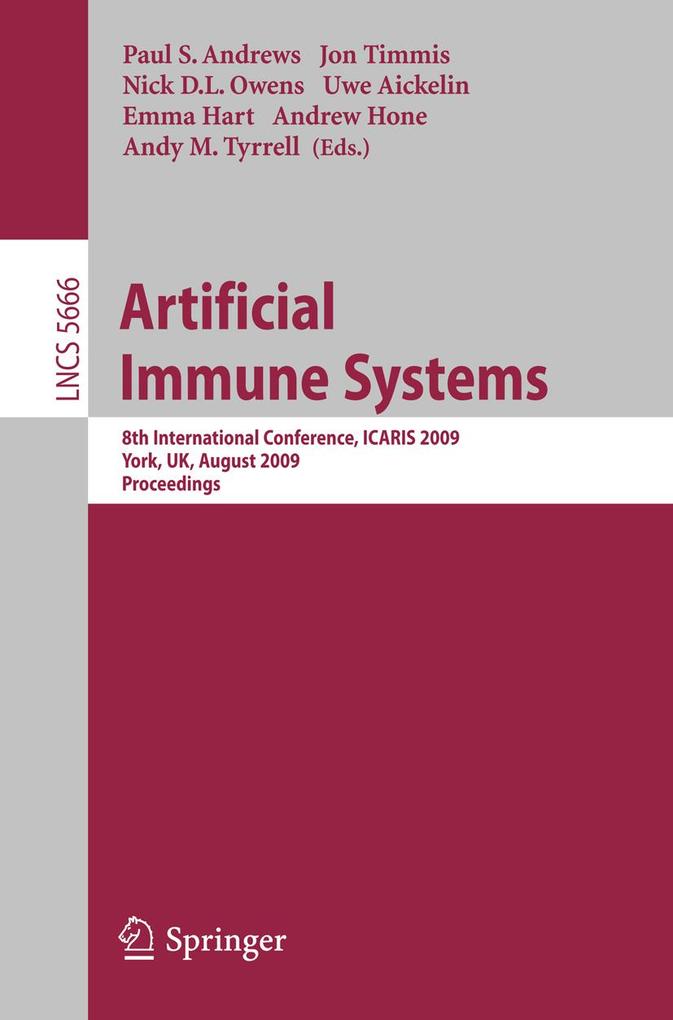
Sofort lieferbar (Download)
Arti? cial immune systems (AIS) is a diverse and maturing area of research that bridges the disciplines of immunology and engineering. The scope of AIS ranges fromimmune-inspiredalgorithmsandengineeringsolutionsinsoftwareandha- ware, to the understanding of immunology through modeling and simulation of immune system concepts. AIS algorithms have been applied to a wide variety of applications, including computer security, fault tolerance, data mining and optimization. In addition, theoretical aspects of arti? cial and real immune s- tems have been the subject of mathematical and computational models and simulations. The 8th InternationalConference on AIS (ICARIS 2009)built on the success of previous years, providing a forum for a diverse group of AIS researchers to present and discuss their latest results and advances. After two years outside Europe, ICARIS 2009 returned to England, the venue for the ? rst ICARIS back in 2002. This year s conference was located in the historic city of York, and was held in St. William s College, the conference venue of York Minster, northern Europe s largest Gothic cathedral.
Inhaltsverzeichnis
Immune System Modeling. - Agent Based Modeling of Lung Metastasis-Immune System Competition. - Using UML to Model EAE and Its Regulatory Network. - Non-deterministic Explanation of Immune Responses: A Computer Model. - Dendritic Cell Trafficking: From Immunology to Engineering. - A Hybrid Agent Based and Differential Equation Model of Body Size Effects on Pathogen Replication and Immune System Response. - Nonself Detection in a Two-Component Cellular Frustrated System. - Questions of Function: Modelling the Emergence of Immune Response. - Object-Oriented Refactoring of Existing Immune Models. - Mathematical Model of HIV Superinfection and Comparative Drug Therapy. - Theoretical Aspects of Artificial Immune Systems. - Exploration of the Dendritic Cell Algorithm Using the Duration Calculus. - On AIRS and Clonal Selection for Machine Learning. - A Theoretical Analysis of Immune Inspired Somatic Contiguous Hypermutations for Function Optimization. - Comparing Different Aging Operators. - Efficient Algorithms for String-Based Negative Selection. - T Cell Receptor Signalling Inspired Kernel Density Estimation and Anomaly Detection. - Applied Artificial Immune Systems. - An Immuno-engineering Approach for Anomaly Detection in Swarm Robotics. - An Immune-Inspired Approach to Qualitative System Identification of the Detoxification Pathway of Methylglyoxal. - Application of AIS Based Classification Algorithms to Detect Overloaded Areas in Power System Networks. - Artificial Immune System Applied to the Multi-stage Transmission Expansion Planning. - Immune Learning in a Dynamic Information Environment. - Unsupervised Structure Damage Classification Based on the Data Clustering and Artificial Immune Pattern Recognition. - A Sense of `Danger for Windows Processes. - An Immunity Inspired Real-TimeCooperative Control Framework for Networked Multi-agent Systems. - Managing Diversity on an AIS That Solves 3-Colouring Problems. - An Error Propagation Algorithm for Ad Hoc Wireless Networks. - Grammar-Based Immune Programming for Symbolic Regression. - A New Algorithm Based on Negative Selection and Idiotypic Networks for Generating Parsimonious Detector Sets for Industrial Fault Detection Applications. - Parametric Modelling of a Flexible Plate Structure Using Artificial Immune System Algorithm. - A Hybrid Approach for Learning Concept Hierarchy from Malay Text Using GAHC and Immune Network. - An Immune Inspired Algorithm for Solving Dynamic Vehicle Dispatching Problem in a Port Container Terminal.
Produktdetails
Erscheinungsdatum
12. August 2009
Sprache
englisch
Seitenanzahl
343
Dateigröße
12,39 MB
Reihe
Lecture Notes in Computer Science
Herausgegeben von
Jon Timmis, Nick D. L. Owens, Uwe Aickelin, Emma Hart, Andrew Hone, Paul S. Andrews, Andy Tyrrell
Verlag/Hersteller
Kopierschutz
mit Wasserzeichen versehen
Produktart
EBOOK
Dateiformat
PDF
ISBN
9783642032462
Entdecken Sie mehr
Bewertungen
0 Bewertungen
Es wurden noch keine Bewertungen abgegeben. Schreiben Sie die erste Bewertung zu "Artificial Immune Systems" und helfen Sie damit anderen bei der Kaufentscheidung.










